Before and during COVID-19, an e-voucher initiative makes a difference for Kenyan farmers
IFAD Asset Request Portlet
Asset Publisher
Before and during COVID-19, an e-voucher initiative makes a difference for Kenyan farmers
Estimated reading time: 4 minutes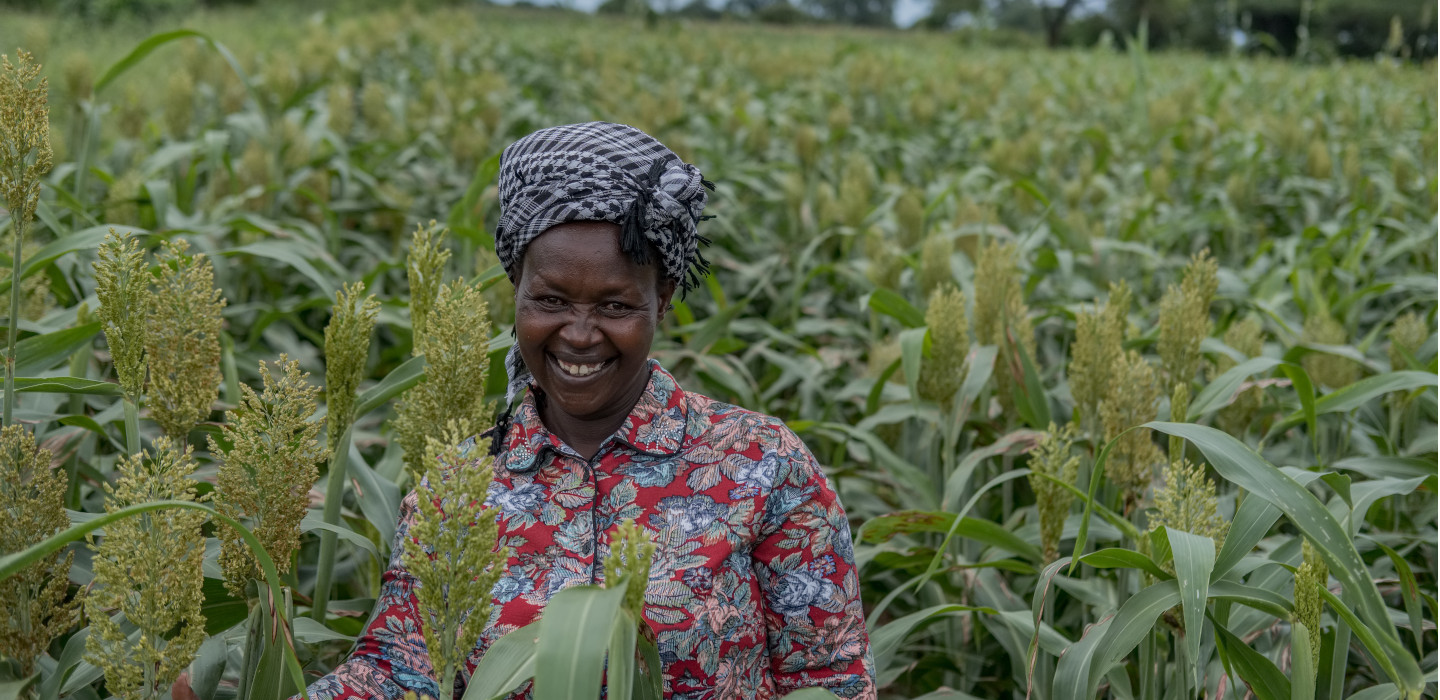
Victoria Muteti, a 44-year old farmer living in Kenya’s Makueni County, has many reasons to be satisfied. In January 2020, she was able to harvest more than 2,500 kilograms of sorghum from her 2.5-acre farm – far more than the 1,000 kg she harvested in 2019. Her production of green grams rose too, from 316 kg in 2019 to 360 kg this January. In the previous year, she’d harvested only 90 kg of each. Most recently, she was able to sell part of her harvest, earning about US$800.
These gains couldn’t have come too soon for Victoria. Luckily, she is able to keep farming during the COVID-19 pandemic while observing all the necessary social distancing measures, and the extra income she’s made over the last two years has helped her improve her nutrition – along with many other facets of her life.
Victoria owes these successes to her participation in an e-voucher initiative she enrolled in under KCEP-CRAL, a programme implemented by the Government of Kenya and jointly funded with IFAD and the European Union. Although the initiative was begun long before the outbreak, its positive effects are helping Victoria – along with many of her fellow participants, representing links all along the agricultural value chain – weather the current storm.
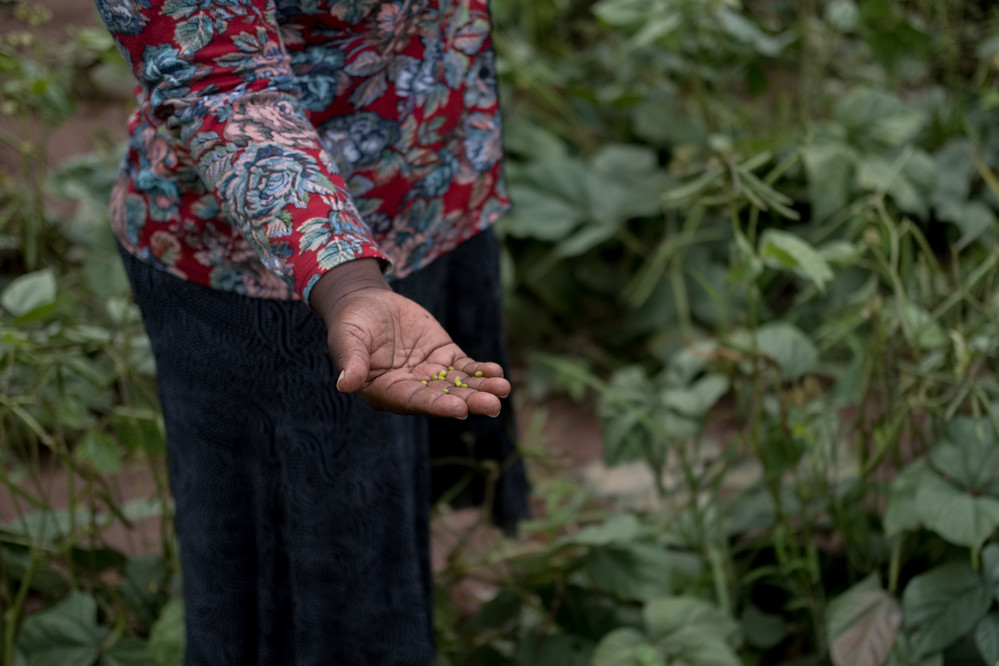
© IFAD/Edward Echwalu - Victoria inspects her farm of green grams.
“Before the programme started, we just planted and hoped for what God would give us; now we know – for sure – we will get more food,” she says.
As part of the e-voucher initiative, Victoria received certified seeds, fertilizers, pesticides and post-harvest items, along with training in good agricultural practices, learning new ways to till her land and safely apply agrochemicals. She was even able to access sustainable soil ripping services, rendered by conservation agriculture service providers also linked to the e-voucher platform, that preserve the land and improve water storage capacity.
Victoria’s nutrition and food security improved, too. Before she joined the programme, she depended on government assistance between each harvest. Now she has a surplus of crops to sell and can earn an income. Her diet has also been enriched. She can now eat some of the sorghum she grows, instead of saving it all for her chickens. She has also invested part of her income into a poultry house and a cow, which will further fortify her diet and bring additional revenue.
For the current planting season, about 4,800 KCEP-CRAL farmers across eight counties have accessed assorted inputs and conservation agriculture services through the e-voucher initiative – all while observing the necessary restrictions.
The staple crops produced by these farmers contribute to national food stocks – and thus, ensure continued food security. Currently, about 2,500 metric tons of maize are stocked in programme-supported facilities and will be bought by the Government of Kenya as part of the nation’s efforts to bolster its food reserves.
Many farmers are able to keep their own grain stores, too, thanks to KCEP-CRAL–provided tarpaulins and hermetic bags. Their current stocks will help them maintain food security until the next harvest – a crucial resource, given that many markets around the country are currently disrupted.
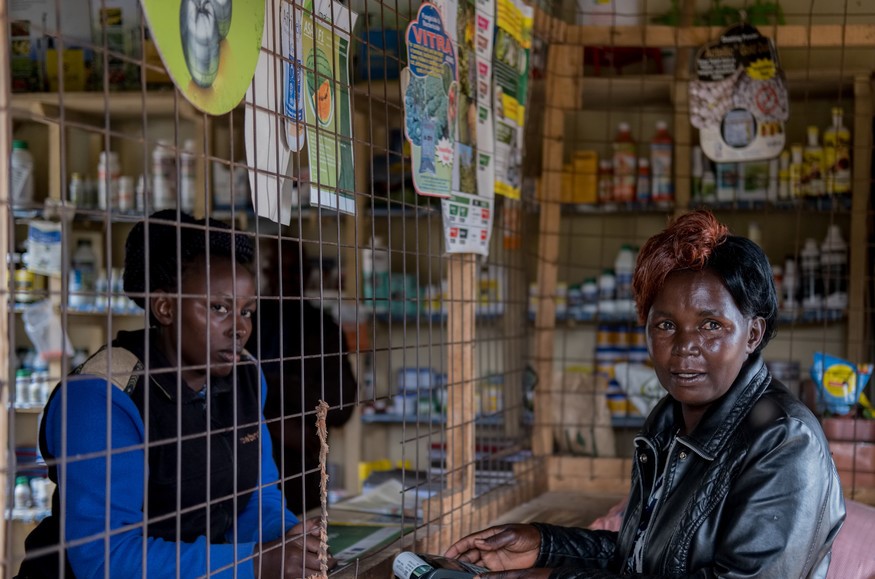
© IFAD/Edward Echwalu - Malia swipes her e-voucher card during a visit to an agro-dealer.
In addition to farmers, KCEP-CRAL brings value to many other actors. Providers of conservation agriculture services, for example, have especially benefited from the programme. Demand for their services is high, outstripping supply and capacities in most cases.
Malia Kimanthi, a 54-year-old farmer, has gained a lot from her participation in the e-voucher initiative. Trained in conservation agriculture during a previous EU-funded project implemented by FAO that KCEP-CRAL builds upon, she now teaches it to other farmers and also operates a soil-ripping service.
“The project changed my life. I have now a modern house and I am able to send two of my children to university,” said Malia last December. “Also, I [have] enjoyed working with the farmers and explaining how conservation agriculture can bring better yields and surplus.”
Malia currently rents two tractors to provide her soil ripping services. She hopes to get credit from a bank and buy her own tractor in a couple of years, when her first daughter will have finished university.
Meanwhile, 28-year-old Oscar Makau Nzioka has benefited from the programme as well, if indirectly. He saw an opportunity in mechanized agriculture services and invested in two tractors, which he now rents out to others – including Malia.
“The demand for conservation agriculture and tractor services is more than the supply. [It] is insatiable,” says Oscar.
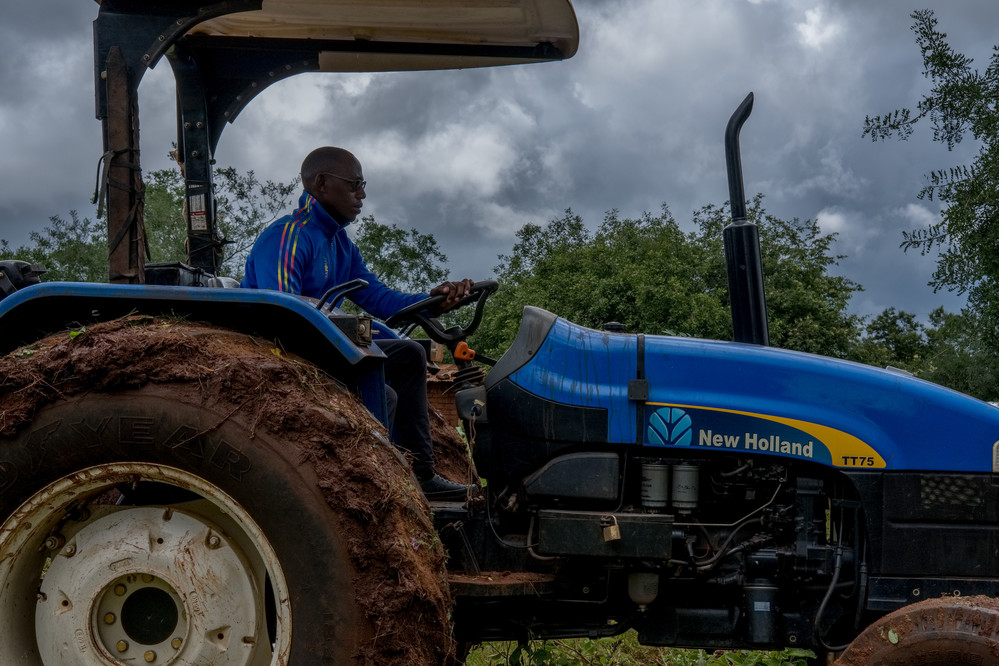
© IFAD/Edward Echwalu - Oscar drives one of his tractors.
In the nearby village of Nthonguni, the e-voucher initiative has also benefited Urbanus Wambua, the local agro-dealer. Before COVID-19, his business grew by 40 per cent after he joined the programme. He was also able to create jobs: last autumn, he hired a local resident to assist him in his shop.
Recently, the new movement restrictions and health safety measures have kept buyers away, leading to a 50 per cent drop in sales. But Urbanus is optimistic that sales will resume when the emergency is over.
The programme’s holistic approach to development ensures KCEP-CRAL’s success. The programme targets interventions at every level of the value chain to benefit all: researchers, farmers, input suppliers, agro-dealers, agriculture service providers, financial institutions and market players, as well as the government. In total, nearly 83,000 smallholder farmers have benefited from the e-voucher initiative.
It has been so successful, in fact, that the Government of Kenya is currently scaling up the e-voucher initiative through a phased approach to cover other commodities throughout the country. As with many other initiatives across the world, any intervention that helps small producers keep working is a welcome ally against COVID-19.
Read more about IFAD’s response to COVID-19.
Learn more about IFAD’s work in Kenya.
Read more here about IFAD’s partnership with the European Union.
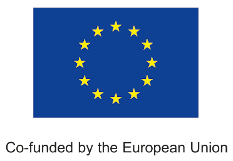
The KCEP CRAL programme is co-funded by the European Union. The contents of this webstory are the sole responsibility of IFAD and do not necessarily reflect the views of the European Union.
Publication date: 11 May 2020